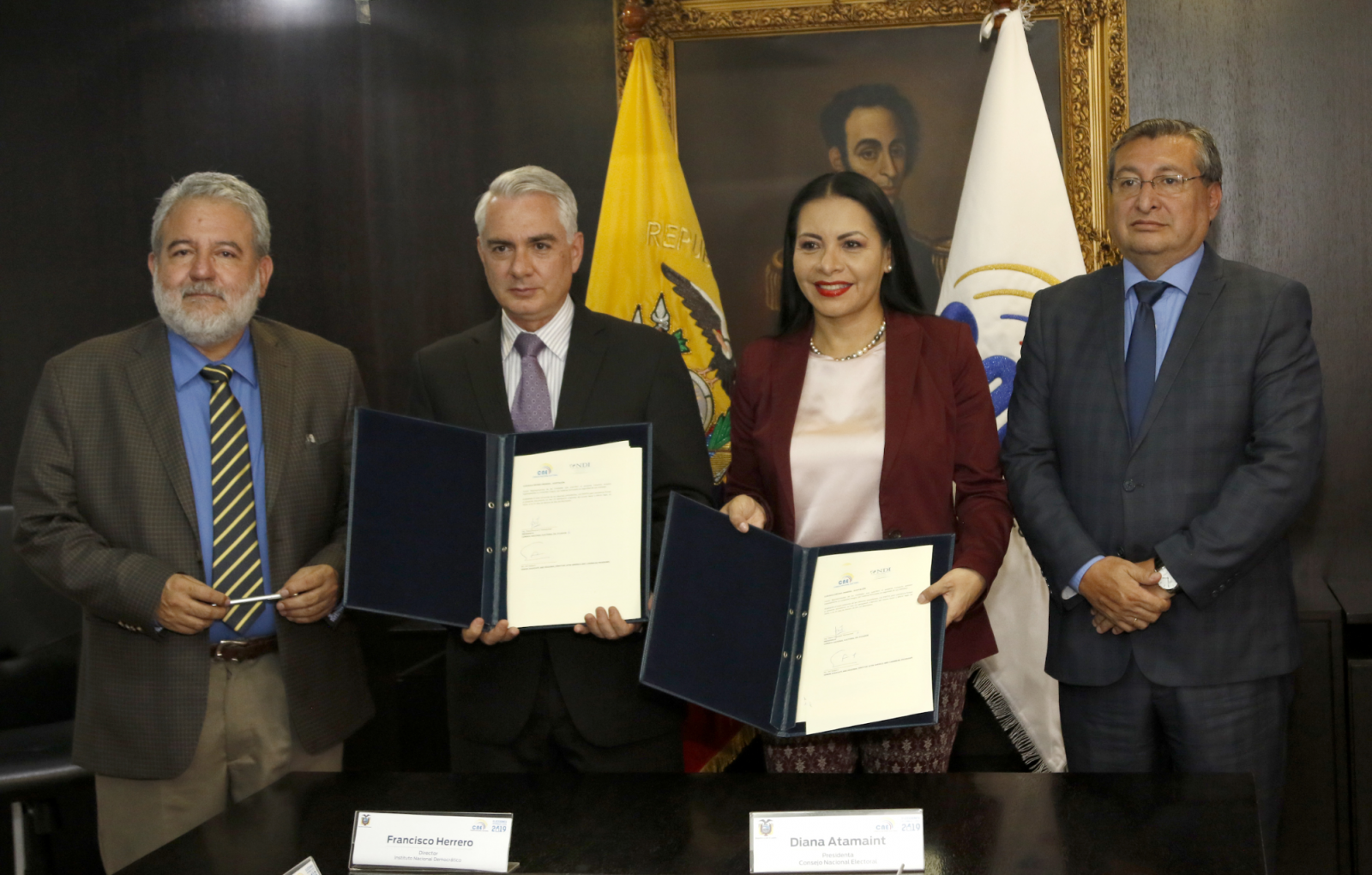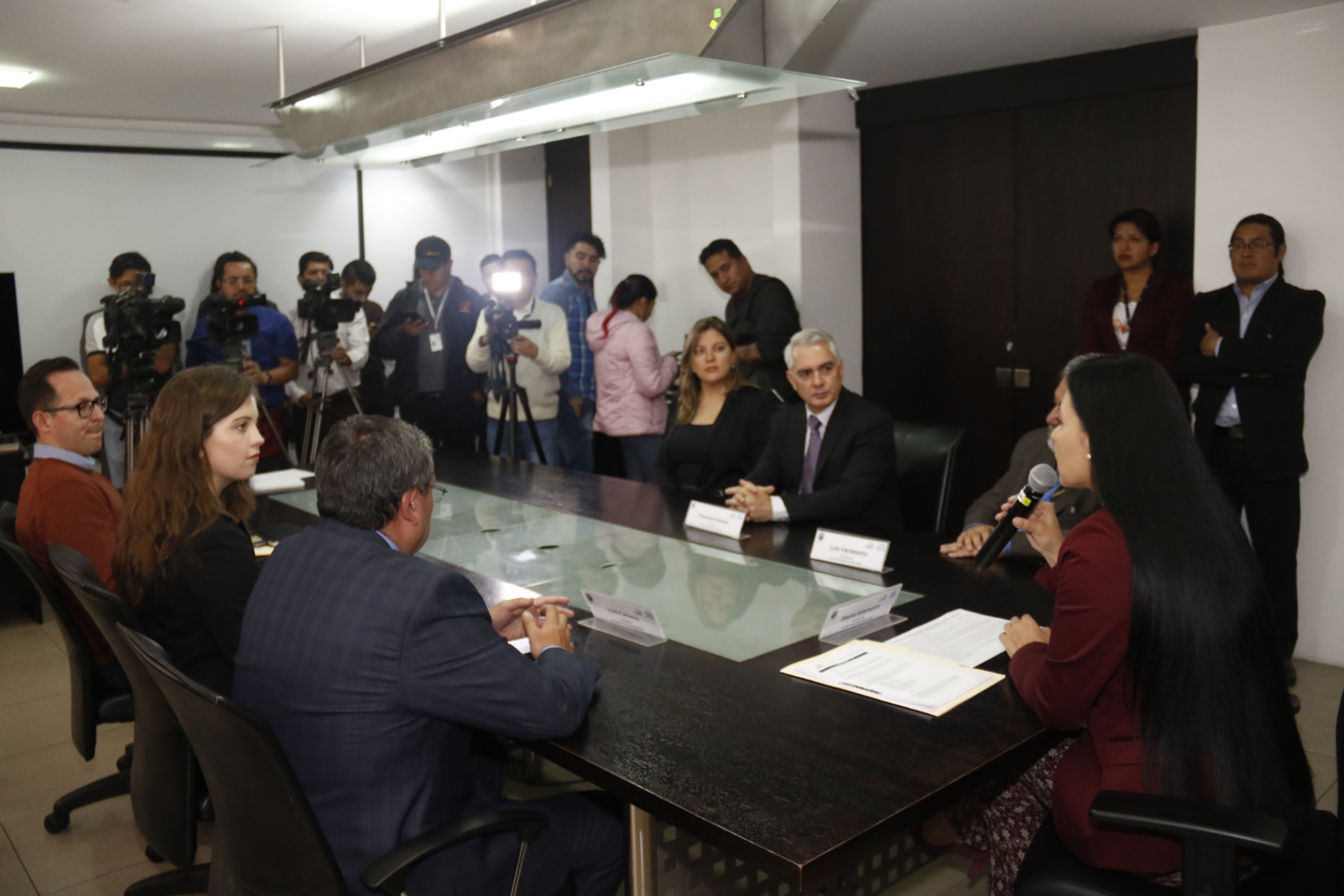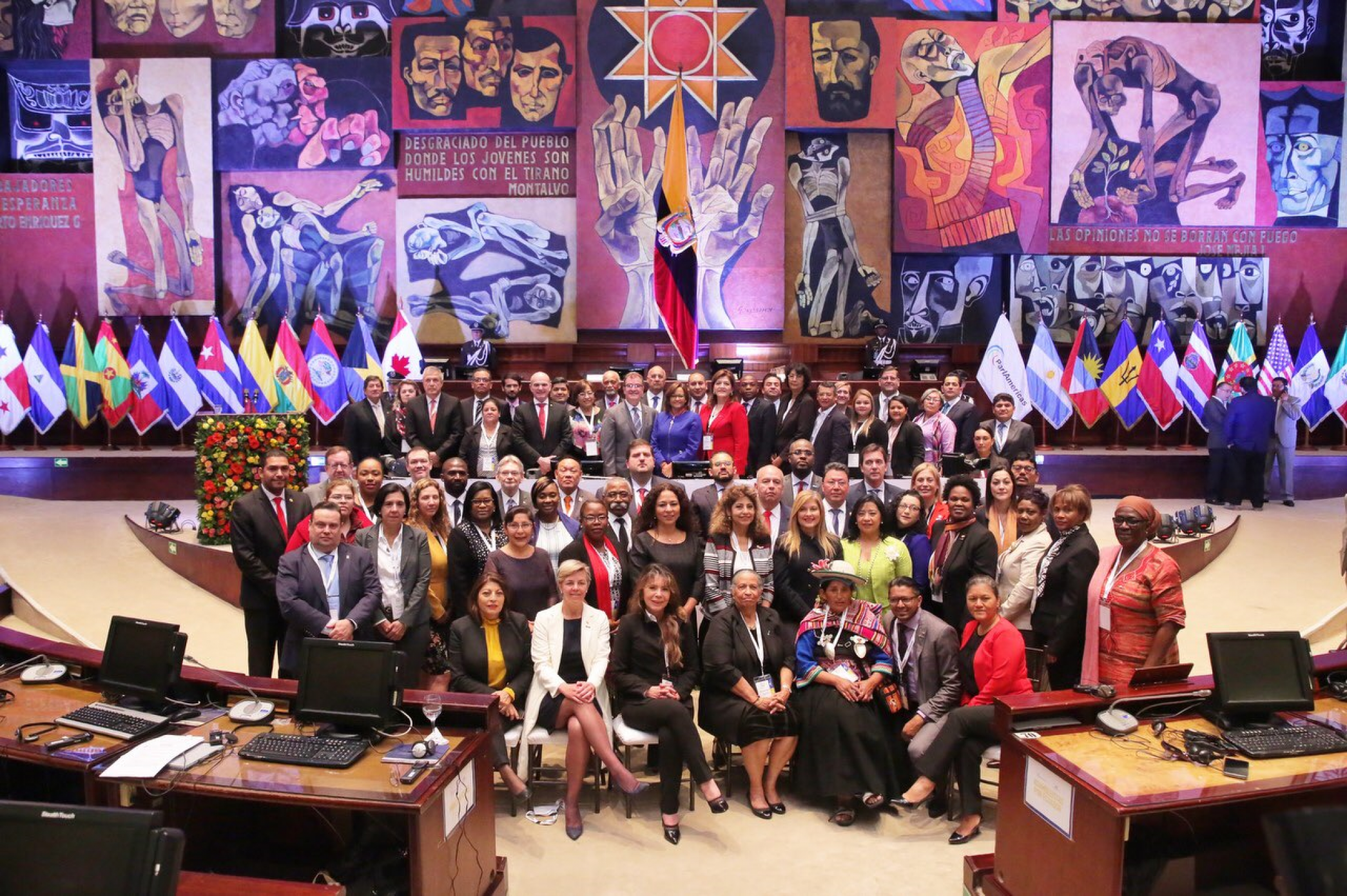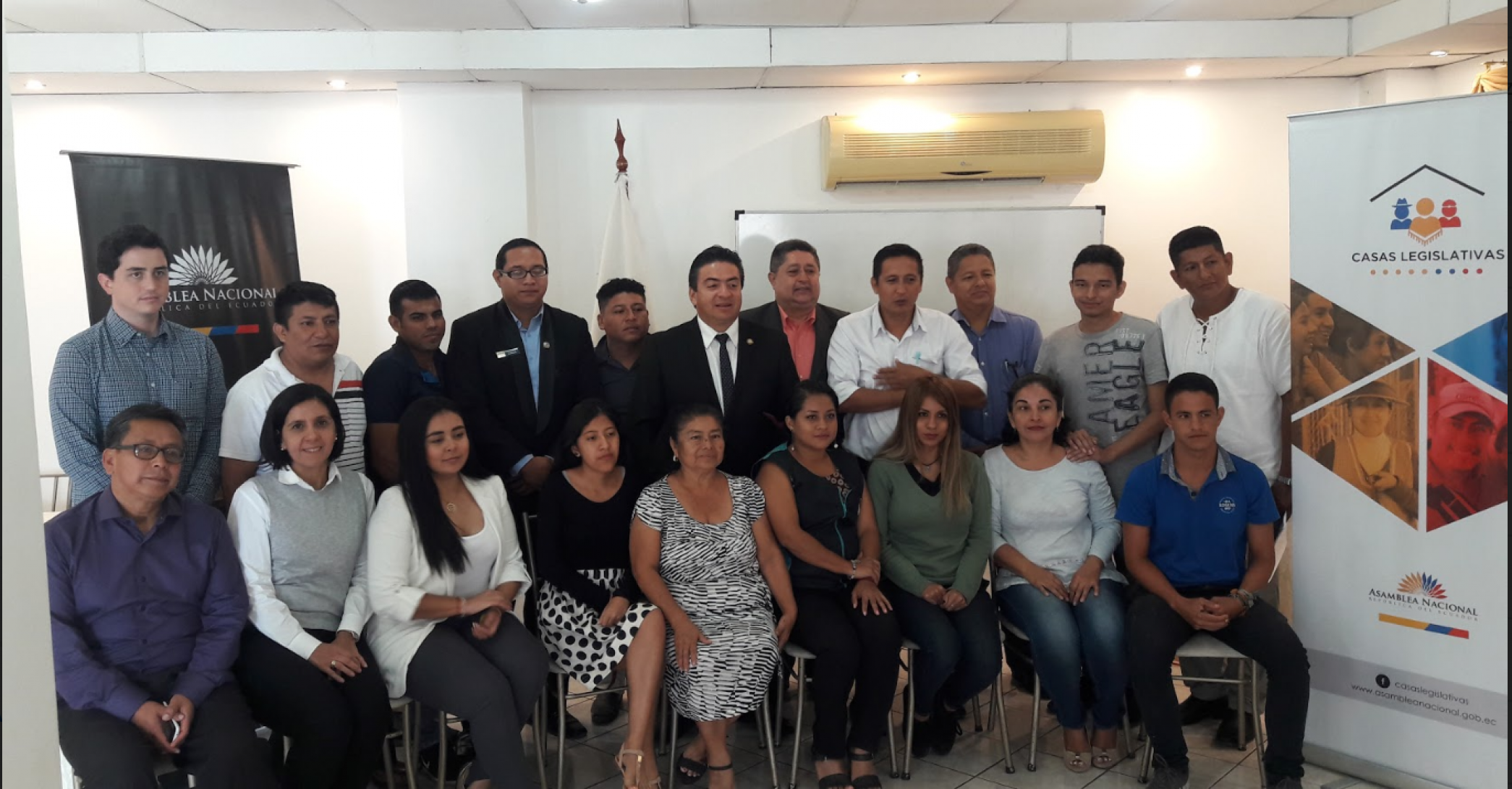
NDI-Colombia Senior Resident Director Francisco Herrero (second from left), along with National Electoral Council President Diana Atamaint (third from left) and council magistrates Luis Verdesoto (left) and José Cabrera (right), after signing an agreement on February 25 formalizing collaboration on electoral law reform, violence against women in politics and political finance regulations. Photo by Ecuador’s National Electoral Council.
SHARE
A record 80,281 candidates representing 278 political parties and movements competed in Ecuador’s March 24 regional elections – over three times as many candidates as in 2014. These were the first regional elections since Lenin Moreno was elected president and adopted a reform agenda opposed by former President Rafael Correa, effectively splitting the Country Alliance (Alianza Pais, AP) which had governed Ecuador for ten years. The results suggest a reshuffling in Ecuador’s political coalitions ahead of the 2021 presidential and National Assembly elections. NDI has been working with Ecuadorian government institutions, political parties and civil society organizations to strengthen democratic institutions, promote transparency and inspire citizen participation in government in this new political era.
While the elections were peaceful and largely well-run, according to Organization of American States observers, the National Electoral Council (Consejo Nacional Electoral, CNE) struggled with a faulty transmission system and a website that was inaccessible from 8 pm on election day until the following morning. Amid voting recounts and unsubstantiated allegations of fraud, the CNE did not announce its official ballot count until almost two weeks after the elections. Such issues are in some respects understandable considering that the five-member council began its term in November 2018, with only four months to prepare for these complex elections.
While the sheer number of candidates and new and reemerging political movements revealed a country bursting with new political energy, they also underscored the need for steps to promote stable party competition as the CNE prepares a new electoral law and establishes the “rules of the game” before the pivotal 2021 presidential and legislative elections. Building off of its global initiative the Blueprint for 21st Century Parties, NDI will continue to work with Ecuador’s political organizations as they reflect on the substance of policy structures, reform internal party structures to be more inclusive and democratic, and engage with citizens through innovative communication strategies and outreach.
This collaboration [with NDI] will help us guarantee citizen participation, above all among minority groups.
- CNE President Diana Atamaint
NDI is also supporting CNE officials as they revise Ecuador’s electoral and political party laws, known as the “democracy code.” Ecuador’s constitution mandates that democracy code reforms be completed and approved by the National Assembly by January 2020, a full year before 2021 elections. On February 25, NDI signed an agreement with the CNE formalizing its collaboration on democracy code reform, as well as with combating violence against women in politics and bolstering political finance regulations.
“This collaboration [with NDI] will help us guarantee citizen participation, above all among minority groups,” said CNE President Diana Atamaint during the press conference following the joint signing ceremony.
NDI and CNE Ecuador

The proposed democracy code reforms seek to ensure a participatory and inclusive electoral system that is also stable and comprehensible for the citizenry. The current reform draft would reinstate a proportional election system, strengthen campaign finance and transparency regulations, amend political communications laws, reshuffle competencies between different electoral bodies, and reform political party laws to reduce the number of candidates and institutionalize a more stable party system. This will be done in part by mandating that political movements have a national or provincial presence to compete in local elections, requiring parties to receive four percent of valid votes to receive state funding, and eliminating signatures as the mechanism for legally registering a political movement.
NDI has begun organizing exchanges and workshop discussions with regional experts and CNE officials on these topics, including facilitating a March working session between CNE technical staff and a Chilean expert to develop campaign finance provisions for the democracy code. An NDI expert also led training on strategies to prevent violence against women in politics across the region with CNE magistrates, civil society representatives and National Assembly members based on NDI’s #NotTheCost (#NoEsElCosto) campaign, which advocates that harassment, assault and abuse are not the cost of doing politics for women.
Since 2017, NDI has been working with Ecuador’s National Assembly to develop a stand-alone open parliament action plan with specific legislative commitments toward inclusive, responsive and accountable government within the framework of the Open Government Partnership, which Ecuador officially joined in June 2018. NDI has facilitated peer-to-peer exchanges between Ecuadorian legislators and their regional counterparts, hosted expert visits and sponsored participation in international legislative transparency conferences.
From March 12 to 14, Ecuador hosted a ParlAmericas Open Parliament Network gathering, where the National Assembly underscored its commitment to legislative transparency and announced its new seven-member Open Parliament Working Group.
“The National Assembly needs to be better institutionalized and more independent,” said Wilma Andrade, a legislator and a member of the Open Parliament Working Group. “The implementation of [an open parliament action] is fundamental in Ecuador because transparency prevents corruption and ensures that citizens identify better with their political institutions. In that sense, NDI’s support has been fundamental to strengthening our democracy.”
Ecuadorian legislators alongside legislators from more than 27 countries across Latin America and the Caribbean in the plenary hall of the Ecuadorian National Assembly, following the opening session of the Fourth Gathering of the ParlAmericas Open Parliam

In February, NDI sponsored three action plan working sessions, where civil society groups and legislative staff brainstormed over 60 proposals on transparency, integrity, accountability and citizen participation. They will continue to consolidate these ideas into three to five achievable measures at NDI-sponsored co-creation sessions planned for May.
“We have developed a draft list of top priorities to include in our action plan, including strengthening regional legislative houses (casas legislativas), advancing with a pilot open data program, developing a congressional smartphone application in collaboration with local universities and instituting a parliamentary Institute of Legislative Studies,” said Fernando Burbano, a legislator and member of the Open Parliament Working Group.
Collaboration among civil society leaders and government officials is critical to promoting transparency and developing a cohesive vision for Ecuador. NDI will continue to host roundtable discussions with diverse civil society networks, such as a February 27 meeting with the Convergence Table (Mesa de Convergencia), and encourage civil society participation in co-creation activities.
“The last few months have seen opening by both the National Assembly and the national government toward open government,” said Marcelo Espinel, project director for the Foundation of Citizenship and Development (Fundación Ciudadanía y Desarrollo, FCD), at the March ParlAmericas conference. “The challenge moving forward will be to ensure continuity [and] involve more social organizations that can work together to continue pushing these issues forward.”
NDI looks forward to continuing to work with civil society, political parties, the National Assembly and the CNE to take advantage of this new political moment in Ecuador to strengthen the country’s democratic institutions.
Ecuador National Assembly and NDI



